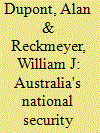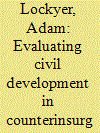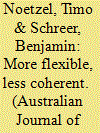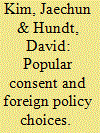|
|
|
Sort Order |
|
|
|
Items / Page
|
|
|
|
|
|
|
| Srl | Item |
| 1 |
ID:
109962


|
|
|
|
|
| Publication |
2012.
|
| Summary/Abstract |
This article1
reviews the seminal influences on Australian national security planning and outlines a methodology for assessing national security risk which provides a workable analytical framework for prioritising Australia's national security challenges and allocating scarce resources in a systematic and integrated way. The authors argue for a System of Systems approach that addresses the most serious security challenges as a whole rather than treating them as independent, compartmentalised issues. The ability to develop effective analytical tools for assessing national security risk will be a key determinant of strategic success in the twenty-first century. Nations adept at anticipating developments, discerning trends and evaluating risk among the clutter of confusing and contradictory change indicators will be significantly advantaged over those which are not.
|
|
|
|
|
|
|
|
|
|
|
|
|
|
|
|
| 2 |
ID:
109964


|
|
|
|
|
| Publication |
2012.
|
| Summary/Abstract |
This article1
investigates public opinion on New Zealand's foreign policy, drawing on the findings of a comprehensive poll of general public and elite opinion conducted in 2008. It analyses what New Zealanders think about a range of foreign policy issues and whether public opinion matches actual foreign policy. It argues that the majority of the public support the broad parameters of official policy, but that there are significant differences of opinion in some specific areas, particularly trade agreements and defence. These differences correspond in particular to political orientation and age, gender and income level. The article also outlines the key differences between public opinion and the opinion of the positional elite. Overall, it is argued that the New Zealand public does have clear opinions on foreign policy issues and that these are generally consistent. The article proposes more frequent polling and more public debate over foreign policy.
|
|
|
|
|
|
|
|
|
|
|
|
|
|
|
|
| 3 |
ID:
109960


|
|
|
|
|
| Publication |
2012.
|
| Summary/Abstract |
It is a widely held belief that civil development programs play a central role in any counterinsurgency campaign. It is assumed that civil development assistance is key to 'winning the hearts and minds' of the civilian population, which, in turn, is crucial for victory. However, there is currently little evidence to support this belief. This article begins by analysing the different methods that have been used in Afghanistan in order to evaluate the effectiveness of civil development programs since 2001. It finds that these methods have severe limitations. Indeed, based solely upon current methods of evaluation, we have no reliable evidence whether civil development programs are actively improving security, having no impact or making matters worse. As such, this article makes the case for a field experiment approach to be adopted in Afghanistan. It argues that field experiments are the most powerful methodology currently available to social scientists for making causal inferences and, by making minor changes to the way in which civil development is distributed, we can vastly improve our understanding of the relationship between aid and security.
|
|
|
|
|
|
|
|
|
|
|
|
|
|
|
|
| 4 |
ID:
109961


|
|
|
|
|
| Publication |
2012.
|
| Summary/Abstract |
At its 2010 Lisbon summit, the North Atlantic Treaty Organization (NATO) took significant steps towards becoming a modern alliance. In the face of a changing security environment and divergent strategic interests among 28 members, NATO adapted its strategic concept and reformed its way of formulating strategy. The new strategic concept advances conflict management as a core task for the alliance. In combination with a greater emphasis on developing partnerships, NATO conceptually strengthened its profile as a global security actor. The summit also reflected a new approach to formulating NATO strategy by providing the Secretary General Anders Fogh Rasmussen with a strong role in setting the strategic agenda. Indeed, he assumed a more supranational function rather than acting as a representative of all allies. But as the Libya operation demonstrates, NATO will struggle to maintain cohesion in an increasingly 'polycentric' alliance. While the focus on conflict management will make the alliance more flexible, it will also become a less coherent global security actor.
|
|
|
|
|
|
|
|
|
|
|
|
|
|
|
|
| 5 |
ID:
109963


|
|
|
|
|
| Publication |
2012.
|
| Summary/Abstract |
It is usually assumed that US policy makers need to generate popular consent in order to undertake regime change against another state. This article explores the ways in which contextual factors such as the joint democracy effect, popular values and public moods influenced efforts by elites in the United States to generate popular consent for regime change in the Philippines and Chile. Against the backdrop of the Vietnam War, the United States undertook covert action in Chile due to public recognition of the target state's democratic credentials and a public mood opposed to further military ventures. In contrast, the absence of a strong joint democracy effect, a national mood infused with romantic nationalism qua militarism and social Darwinism facilitated efforts by US elites to generate consent for the invasion and occupation of the Philippines. Subsequently, this article contributes to understandings of the domestic-level factors that influence foreign policy decisions.
|
|
|
|
|
|
|
|
|
|
|
|
|
|
|
|
|
|
|
|
|